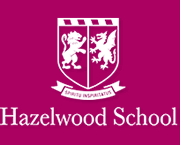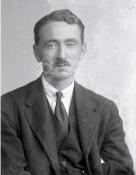
War Memorial
| Captain Christopher CARLILE | |
|
2nd Battalion Royal Scots (Lothian Regiment) Date of birth: 7th August 1878 Date of death: 27th March 1964 Died aged 85 Unknown |

|
| Christopher Carlile was born at "Kingsbury", Kings Road, Richmond in Surrey on the 7th of August 1878 the third son of the Reverend Wilson Carlile, Curate of St Mary Abbot’s Church in Kensington and founder of the Church Army, and Flora (nee Vickers) Carlile of "Inholme", Holmwood, Dorking in Surrey. He was educated at St Paul’s School from September 1890 to July 1897. He went on to Magdalene College Cambridge in 1897 where he achieved a BA in 1902 and later a MA. He came to teach at Hazelwood School from September 1902 to December 1903 when he left for Lancing College where he taught until 1907. He later taught at Loretto School where he was commissioned as a 2nd Lieutenant in the Officer Training Corps on the 28th of June 1913. In early 1914 he accepted a post at Brighton College and transferred as a 2nd Lieutenant in the Officer Training Corps there on the 14th of March 1914. Following the outbreak of war he applied for a commission in the Royal Scots (Special Reserve of Officers) on the 23rd of October 1914. He was commissioned as a 2nd Lieutenant in the regiment from the Unattached List, Territorial Force on the 10th of November 1914 and was attached to the 2nd Battalion of his regiment for war service. He embarked for France on the 24th of December 1914 and joined them on the 31st of December when they were in billets at Westoutre. On the 7th of February 1915 he was admitted to 7 Field Ambulance suffering from influenza after spending five days in the front line trenches and rejoined the battalion in the field on the 27th of April 1915. He was promoted to Captain on the 1st of June 1915 and returned to the base depot on the 18th of July 1915. On the 14th of February 1916 he was attached to 2nd Army Headquarters where he served as an Adjutant and Quartermaster. On the 31st of October 1916 he was appointed as Assistant Instructor at a Cadet School and he joined the Instruction Staff at Blendicque on the 3rd of November. He received orders to rejoin the 2nd Battalion Royal Scots on the 30th of April 1917 and he was seconded as an Assistant Instructor to VI Corps Training School on the 22nd of June 1917. He served as their Education Officer at their Headquarters from the 23rd of March 1918. He returned to England from Boulogne on leave from the 29th of August to the 12th of September 1918. He was demobilised on the 26th of November 1919 at the Dispersal Unit, Crystal Palace and resigned his commission on the 25th of March 1920. After the war he returned to teaching as a master at a preparatory school. He was married at Limpsfield to Rosemary Mary "Gay" (nee Lubbock) on the 12th of January 1921; they had three children, Nevile Julian, born on the 1st of July 1922, Rosemary B, born in 1924 and Henrietta C, born in 1926. They lived at "Ridlands", Ridlands Lane in Limpsfield. He enlisted at Limpsfield as Private 175 in the Queen's Royal Regiment Defence Force on the 11th of April 1921 in response to the General Strike by the trades unions. At a medical examination, which was held on the same day, it was recorded that he was five feet eleven and a half inches tall and that he a dark complexion, dark hair and grey eyes. He was discharged at Croydon on the 3rd of July 1921 on the termination of his period of engagement. Later in 1921 he was appointed as an assistant master at Harrow School where he taught English and French until he retired in 1938. He returned to the school in 1944 due to staff shortages caused by the war when he was Housemaster of the Small House, (Northwick) from September 1945 until he retired again in the summer of 1946. He lived at Northwick Lodge, Harrow until he died. An appreciation of his life and career appeared in the Harrovian, the Harrow School magazine, in their edition of the 24th of January 1939 which wrote that he: - "...dwelt upon the interests and character of this most unconventional of masters who inspired affection amongst his pupils and colleagues that was no less strong for being tempered sometimes by exasperation; exasperation which did not perturb him because he delighted to tease by his unorthodox attitudes in politics and religion, and to champion causes in neglected places and amongst deserving people where others might not trouble to look. He was the underdog's schoolmaster, whose sympathy and interest were most likely to be aroused by the Lower School boy who wanted to look at birds and insects instead of playing games, by the indifferent cricketer who did not bother with text book shots or by the boy scout who didn't know how to light a fire. He was no intellectual, no great games player; a schoolmaster out of no accepted or familiar mould. How valuable to a community such men are! Not only because they look after the "bits and pieces" but because they may be able to help enliven a dull day for a bored boy, to put the shy boy at his ease, to remind him who seems to lack the passport to success in school life that there is something more that a good eye for a ball, or speed of mind. To these C.C. with his love and knowledge of nature, his gentleness and courtesy to all, hi s opportunist methods in the form room and his approachability outside it, was a friend indeed. Pomposity and unctuousness, formalism and pedantry, snobbishness and status consciousness accused of these faults. C.C. had his critics but not on such counts as these. He was the most unworldly of men." |
|
Back